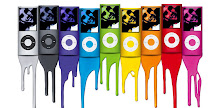Sept 9, 2008: Throughout my studies of Women's and Gender Studies I have held an interest in masculinity, the ways it has been constructed, and how it functions in a society that is permeated with male violence. Last weekend during an evening out with friends the night turned sour when a street fight broke out between six Italian men. While the reason for the dispute was unclear, many interesting things were going on. As the fight began a circle of spectators instantly surrounded the increasingly violent fight.The fight began with punches and angry pushes, but seemed to ebb and flow according to the audience's attention. As the crowd grew the violence grew, leaving me questioning the ways in which masculinity functions as a performance. Not only were these men fighting each other, they were vying for crowd attention. When the fight seemed to calm and the audience seemed to be dissipating, one of the men came running from behind an opponent sitting on the ground and kicked him squarely in the face. The scene ended with a human being laying knocked out in a blood covered street.
This experience left me feeling sick to my stomach and angry at the ways in which violence has been historically drawn as a central quality of masculinity. That evening it appeared that the violence held an entertainment value, even though one individual was left close to death. What does it mean to live in a society where men's violence is both regarded as commonplace and seen as a source of entertainment? Even more so, what does it mean to live in a society where 85% of murder, 90% of assault, 95% of domestic violence, 95% of dating violence, 95% of child sexual abuse, and 99.8% of rape is all committed by men? (Jhally). This conversation is not about making violence gender neutral, instead it is about realizing the forces that create violence as a quality of manhood and taking steps to break this framework. Feminists have noted the ways in which a term like "boys will be boys" has created a box which has confined males to violent and dominant stereotypes. But when do these sorts of phrases become outdated? When young boys fighting with each other is written off as a part of 'boyhood,' doesn't that begin to create a slippery slope to excusing men's violence as a part of manhood? A way to begin this change is to begin to look critically at the media and at the wider society and dissect moments when men's violence is regarded as natural or normal, or even entertaining.
The language barriers presented in this study abroad experience have been challenging, but I seek to take moments such as these to discuss the ways that the construction of a violent manhood leads to a violent society. When men and women are more willing to challenge this definition of manhood, an important step is taken towards reducing men's violence in the world. When this sort of change is created it is not only beneficial for the victims of men's violence, it is a rewarding to all men who no longer have to live associated with this limiting identity. When the rape jokes and the glamorization of men's violence become present in our everyday lives, we can no longer live as silent bystanders, we must challenge these norms and begin to consider the ways in which these everyday occurrences contribute to a violent society.
Tough Guise: Violence, Media & the Crisis in Masculinity. Dir. Sut Jhally. Perf. Jackson Katz. 1999.

